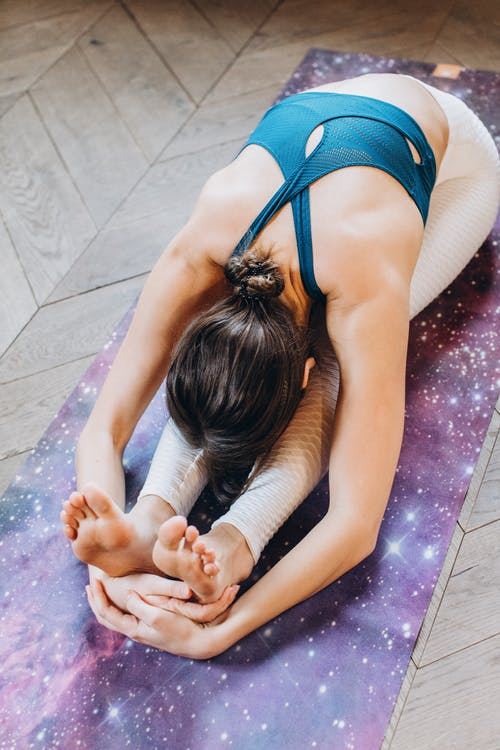Stress is a condition of extreme mental or emotional tension. Because some stress is unavoidable in everyday life, managing stress is crucial for many aspects of your health. Many scenarios lead to stress, from the rush to leave the house and navigate the traffic to minor irritants like a broken dishwasher or a blocked sink.
It's not healthy to have too much stress in your life because it can cause bodily issues. Stress excess compromises your metabolism, weakens your immune system, and may even alter how your brain processes information. An excessive amount of stress might make it difficult for you to obtain a good night's sleep and may harm your relationships. To prevent stress from rising to unhealthy levels, there are fortunately many healthy and constructive ways to handle it.
Tea's Relaxing Properties
 |
| pexel photo |
Numerous teas provide benefits for relaxation and stress reduction. The dried flowers and leaves of the chamomile plant are used to make chamomile tea. This tea is thought to relieve sleeplessness and anxiety. An unsettled stomach, a typical sign of stress, can be soothed by chamomile tea. You can have a cup of chamomile tea approximately 30 minutes before bedtime to help you get a restful night's sleep because it contains no caffeine.
Peppermint tea is a fantastic alternative. Benefits of this sort of tea include improved relaxation and improved digestion. Additionally devoid of caffeine, peppermint tea is a healthy beverage to sip before bed. The main component of peppermint tea, menthol, also lessens pain and inflammation. The tea can reduce inflammation and pain since stress chemicals like cortisol make these conditions worse.
Tea preparation alone is calming. Pick yourself a lovely teacup and saucer yourself. Add a few drops of lemon juice for vitamin C which strengthens the immune system and a few drops of raw, organic honey for sweetness and other health advantages.
Essential Oils for Reducing Stress
The management of stress can benefit from the use of essential oils. Consider using geranium and rose essential oils. These essential oils support mood enhancement and stress reduction. Try lemon essential oil as well. While vitamin C enters your skin and strengthens your immune system, the energising aroma can uplift your mood. The discharge of poisons and negative energies that accumulate from repeated exposure to stressful conditions is aided by ylang ylang essential oil.
There are many applications for essential oils. For every ounce of shampoo or conditioner, one drop of essential oil can be added. Additionally, essential oils can be used topically to your pulse spots, such as the inner wrists. Your body's heat warms the oils, making them active. Find a little glass vial with a cork and use that to store essential oils instead. Check to see if the glass vial has a clasp so you may use it as a necklace. All day long, the oils will spread from the cork and offer their stress-relieving effects.
Take a Relaxing Bath
If you want to relax your body and reduce tension, think about taking a long bath. Try taking a bubble bath to unwind. If you tend to stiffen up when agitated, a warm bubble bath can assist your muscles, ligaments, and tendons relax. An Epsom salt or mineral bath can also be beneficial for reducing tension. These salts aid in your body's ability to remove pollutants. They also enhance your skin's ability to recover. Several drops of your preferred essential oils can also be added to the bathwater.
Stress-Relieving Meals
 |
| Pexel photo |
You can try a variety of foods that reduce stress. A square of dark chocolate gives your brain endorphins. Antioxidants found in dark chocolate can help to counteract some of the negative effects of stress on the body. Make sure to consume very little chocolate. Because it includes caffeine, avoid eating it four hours before going to bed.
Pistachios are another superfood worth trying. In a single tiny container, pistachios include complex carbs, dietary fibre, protein, and healthy fats. They deliver nutrients like folate, riboflavin, potassium, lutein, and vitamin B-6. You can manage your weight, lower your cholesterol, and restore good skin thanks to these nuts. Pistachios are a fantastic source of antioxidants and support your immune system by reducing the negative effects of stress.
Another stress-relieving snack is seeds. Pick sesame, chia, or pumpkin seeds. These foods with little processing include important nutrients like manganese and copper, have a lot of dietary fibre, and make you feel full after a small amount.
In addition to experimenting with those superfoods, alter your diet in general. Your body will be more capable of handling stress when it is healthy. Prioritize whole grains, lean proteins, and healthy fats as well as complex carbohydrates. Make sure your body is well hydrated, paying special attention to getting adequate water. Reduce the amount of added sugar and caffeine in your beverages. Avoid using food, alcohol, or other addictive drugs as self-medication. In the end, they'll make your stress worse.
Exercise to Reduce Stress
Exercise is beneficial for stress management. Your body naturally releases endorphins when you work out. Your mood is affected by the endorphins, which aid in letting go of unpleasant feelings. After an exercise, endorphins' effects might last for several hours. You don't have to be an athlete to benefit from exercise's beneficial stress-reduction effects.
Think about going for a 30- to 60-minute walk outside. Locate a lovely park and take in the scenery. You may wander around a mall in bad weather. You have the chance to challenge yourself by using the exercise equipment in the gym. You can enhance your metabolism and develop muscle via aerobic activity and weightlifting.
There is a certain sense of satisfaction in letting your energy out while performing a leg press or bench press after a particularly stressful day. Try low-impact exercises like yoga or swimming if you have sore joints. Try something different if your regular fitness routine is getting boring. Rock climbing, including indoor climbing, challenges you while working out your entire body. While exercising, turn on some motivating music to get your body going.
Mindful Meditation
By engaging in meditation or controlled breathing exercises, many people find respite from stress. In order to focus on the present moment and clear your mind of negative thinking patterns, meditation is a particularly helpful technique. If you've never meditated before, you can work with a teacher or watch a helpful video. Numerous yoga instructors provide advice on meditation.
Conscious breathing is also beneficial. Anytime, wherever, you can practise controlled breathing. During a highly stressful situation, you can take 10 deep breaths and hold them for a few seconds before expelling, even if you only have 30 seconds to do so. Nobody needs to know that you are using a stress-relieving technique at your job or while driving in congested traffic.
Conscious breathing is also beneficial. Anytime, wherever, you can practise controlled breathing. During a highly stressful situation, you can take 10 deep breaths and hold them for a few seconds before expelling, even if you only have 30 seconds to do so. Nobody needs to know that you are using a stress-relieving technique at your job or while driving in congested traffic.
THIS IS HOW TO EVOKE CALMNESS
Stress Reduction Through Hobbies
 |
| Pexel photo |
As a method of stress management, consider taking up some creative activities. There are numerous methods to decompress through the arts. For instance, playing with clay in a ceramics class is the perfect way to unwind. You can let off steam by pounding the clay to remove air bubbles. You become more relaxed as you roll the clay repeatedly. You can focus on anything other than yourself by moulding the clay into a shape. The process of glazing your ceramic artwork is extremely relaxing.
Additionally, the repeated motions of knitting, crocheting, stitching, and colouring in a colouring book are all excellent stress relievers. Consider painting, gardening, weaving, spinning, completing puzzles and crossword puzzles, as well as other relaxing activities. Other stress-relieving tasks like cleaning and cooking can help some people.
Pets: A Relaxation Aid
 |
| Pexel photo |
Think about spending time with animals. Blood pressure is known to be lowered and the body and mind are known to be relaxed by the simple, repetitive act of petting or brushing a cat or dog. Pets are typically happy to comply. A cat's purring may be very soothing, and the warmth of the animal's body is comforting to your tired body.
Consider volunteering at your neighbourhood shelter if you don't have a pet. Both you and the animals benefit from dog walks and kitty grooming. You can lessen stress by engaging in activities like horseback riding, bird watching, and relaxing while watching fish swim in an aquarium.
Avoid tense circumstances (When Possible)
If at all feasible, you might want to limit your exposure to stressful events. Inform everyone that there won't be any political conversations if they are taking the fun out of your family reunions. Try to assign those duties if you feel overburdened when handling a certain scenario, such as home repairs.
Avoid that coworker as much as you can if they seem to irritate you or are never positive. Avoid engaging in activities like complaining or gossiping. Even if you are not participating in these activities, you may become agitated by them. You may become uptight and anxious just by hearing such conversations.
Get enough Sleep
Additionally crucial is getting regular, adequate sleep. Sleep is when your body heals itself. Your brain creates memories while you sleep, and your immune system also works during this time to keep you healthy.
Plan to go to bed each night at the same hour. Turn your bedroom into a haven. Remove the computer and television. Eliminate the mess. Hang the clothing up. Make use of room-darkening drapes or blinds and adjust the thermostat to a cosy setting. Only use your bed for intimacy and sleep; don't use it for stressful tasks like working or paying payments.
In summary
Everybody occasionally feels stressed. Even a little worry might spur you on to do something positive. Use one or more of these techniques to lower your stress when you start to feel like it is too high. These stress-reduction techniques will enhance general health and wellbeing.
Photo by Ali Alcántara





